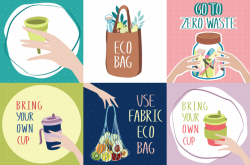Basically, being ecologically conscious means showing concern for the environment - or that is the widely accepted definition. But, for different people, “showing concern” can mean different things: from making related posts on the Internet to taking direct action; there is even such a phenomenon as eco-terrorism (civil disobedience and sabotage in the name of environmental causes). Some trace environmentalism to as early as the 7th century; still, environmental ideas started to become really popular with the general public in the 20th century, when environmental problems, such as whole species of animals dying out or different man-induced disasters, became apparent. As for governments, first modern environmental laws date back to the first Industrial Revolution.
As of now, there are numerous approaches to “being eco-conscious”; some that imply being part of some group and taking action, others - supporting well-known organizations such as “Greenpeace” morally or financially. Still, there are lots of ways you can practice it by yourself - though there are things one should consider.
The basics of being eco-conscious is making eco-friendly choices. Actually, some of those also have to do with improving one’s lifestyle - developing habits like turning off your light after you leave a room doesn’t only save energy, but your money as well; even participating in recycling programs and such can be fun, lets you meet people (being something new for Russia, it is conducted by groups of activists), and also makes you more disciplined.
The other trend is practicing eco-consciousness by using organic products. This way, one does not only do less harm to the environment, but also supports companies that share this same attitude. Organic products are those that meet a set of requirements which have to do with production standards for growing, storage, processing, packaging and shipping; these standards differ from country to country. In most cases, certification is overseen by the government; organic products are labeled with a special mark.
When speaking about organic products, one also has to mention “natural products” and “greenwashing”. As good as it may sound, a product claiming to be “natural” does not mean that it really is. There is actually a marketing tactic called “greenwashing”, when a product is called “natural” or “environmentally friendly” without actually being so. That may have to do with the design of the packaging (green colors, “environmental” motives), product names or even whole PR campaigns.
Another underhanded tactic companies use is labeling their production with markings that look really similar to those used by official certification agencies, often foreign ones. This can be even more misleading; still, there are some mobile apps developed by activists that can help you avoid being fooled.
Unfortunately, there’s yet another problem related to environmentalism – as with any trend, the general public often has misconceptions of it, and that spawns different myths. One of those is that organic products are better for one’s health than inorganic ones. Actually, being “organic” mostly has to do with bringing less harm to the environment - scientific research conducted thus far on various organic food items has not been able to give strong evidence about the superiority of organic food over non-organic food. So eating too much “organic” chocolate is still no good for your health, and the rightfully certified fish they use at McDonald's is still turned into junk food.
The other widespread myth is about genetically modified foods being harmful - as well as similar ones like cell phones causing cancer or the recent ones that have to do with danger posed by nanotechnologies. Most of those are totally baseless; in fact, such sweeping ideas led to the emergence of Environmental Skepticism, which expresses doubt in the environmental movement.
So, if you are planning on becoming more eco-conscious - remember to “trust, but verify”. There are lots of ways to contribute to the environment, so you’ll surely be able to find your own - just make sure that what you are doing is reasonable, so as to not fall prey to some misconceptions or underhanded marketing techniques.




